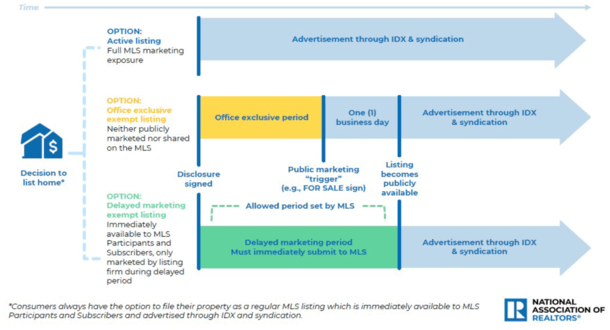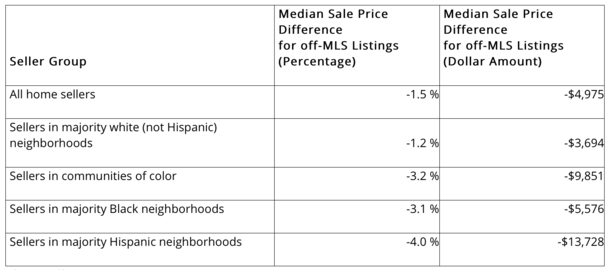A new battle, or perhaps war, is underway for control of real estate listing data.
Depending on who you ask, it’s about the consumer. Mostly the home seller, who logically benefits from maximum exposure to their listing.
The best way to get the most exposure is by agreeing to syndicate your listing to as many portals as possible like Zillow, Redfin, Realtor, etc.
But some real estate brokerages, such as Compass, are moving more of their listings in-house.
While critics call it greedy to “hide listings,” it might actually be a bigger play to avoid going extinct.
Zillow Aligns with NAR on Clear Cooperation Policy

First some quick background.
The National Association of Realtors (NAR) introduced Clear Cooperation Policy (CCP) in 2019, which requires a property that is publicly marketed to be put on the MLS within one business day.
So if the real estate agent goes so far as to even put up a yard sign or send out an email about the property, the listing must also hit the MLS within 24 hours (if not a weekend or holiday).
The idea here is to promote cooperation, transparency, fairness, and ultimately an open housing market where buyers can see everything that is for sale.
It came up after pocket listings became prevalent, where agents would hang onto their listings and not share them publicly, perhaps for their own gain.
Problem is, there are real estate brokerages that feel this is too restrictive, as they might want to try different forms of promotion, advertising, etc., without being beholden to NAR and the MLS.
As such, NAR recently updated CCP slightly to allow for a new option called “delayed marketing” that allows agents to market the listing exclusively while also submitting it to the MLS.
The key differentiator here is they don’t need to advertise it via any syndication, such as an IDX feed that serves companies like Zillow.
In other words, an agent could squeeze out Zillow for a month if they wanted to, while still getting the property in front of all other agents from different brokerages.
Clearly this would not be good for Zillow, as they’d potentially lose thousands of listings overnight and no longer be the place to go if you’re looking for fresh data.
As such, Zillow (and Trulia) is implementing a new rule that goes into effect in May 2025.
“If a listing is marketed directly to consumers without being listed on the MLS and made widely available where buyers search for homes, it will not be published on Zillow.”
In other words, if you don’t list immediately with Zillow, you don’t get to list with Zillow period (for the life of the listing).
The reason they’re doing this is because they know the very real consequences that lie in front of them.
If they aren’t included, they might be in serious trouble as a top real estate destination on the web.
Of course, if sellers go with the new delayed marketing option, the property is technically listed on the MLS right away, so they can eventually share it on Zillow anyway. Right? Maybe?
Unclear, because Zillow simply says it must be entered “in the MLS at the point of publicly marketing.”
This means Zillow is ultimately pushing for the standard listing option where the property goes to the MLS and is syndicated immediately as well.
Zillow Doesn’t Want to Lose Listing Data

Zillow has been very vocal on this subject for a while, citing a study that privately-listed homes disproportionately hurt home sellers of color.
While also saying off-MLS sellers collectively left more than $1 billion on the table over the past two years.
In addition, they found that 63% of ~2,000 recent home sellers said their agent “recommended listing on a private listing network,” per their own survey.
So clearly they’re trying to get ahead of what could be an absolute disaster for them in the near future if this trend increases.
Other than rolling out their new policy and educating the public with surveys and data, they’re partnering with large real estate brokerages.
In recent days, they’ve partnered with eXp and NextHome “to commit to listing transparency.”
NextHome CEO James Dwiggins has been an outspoken critic of companies like Compass, who have been the most outspoken about CCP.
Dwiggins basically argues that brokerages that want to make their listings exclusive hurt the consumer.
Simply put, less exposure means a lower sales price and a poor customer experience as you’d need to visit multiple websites or apps to see all available inventory.
He’s not wrong, right now, but I think it’s a shortsighted take that doesn’t look several steps ahead.
This Is Chess, Not Checkers
My take is that this isn’t really about the consumer. Sure, it’s pretty much a no-brainer that home sellers benefit from more exposure.
The more your listing is seen, the greater the chance a prospective buyer will make an offer. And the more offers, the higher the sales price.
It’s pretty straightforward. But is Zillow really doing this because they care about the consumer?
Or are they doing it because their livelihood depends on it? At the end of the day, they need new listings to continue to be fed to their site.
Without listing data, what would they really be? Sure, you could visit their site to see your off-market property data.
And you could check in on your Zestimate from time to time. But without fresh listing data, their web traffic would plummet.
That would mean a huge loss of revenue, with fewer pageviews to promote various services, both from third-party advertisers and internal offerings such as Zillow Home Loans.
It would also mean fewer real estate agents could advertise on their listing pages via Premier Agent.
Zillow Relies on Public Listing Data to Make Money
What if more real estate brokerages decide not to share their listings going forward via IDX feeds that go to websites like Zillow?
What if home shoppers start going to another site first. At the end of the day, listing sites are a commodity. They’re a dime a dozen.
They all basically show the same information, presented a little bit differently. I can go to Zillow, Redfin, Realtor, Homes, etc.
All these sites will show me the same listings for sale in a given area. There’s not much differentiating them other than which shows up first if I do a web search.
Imagine if I knew they no longer had all the listings in the area where I wanted to buy a home.
Perhaps I’d start incorporating X brokerage into my search as well. All of a sudden, I’m spending more time on that site instead.
These pageviews for the portals are now going to the brokerage instead. And perhaps rightfully so if it’s the brokerage (and real estate agent) that’s actually the one putting together the listing.
Doing all the heavy lifting and hard work. If this were to gain steam, you could see how scary it becomes for the portals.
If the consumer starts elsewhere, these sites could lose relevance very quickly.
Troubling for Rocket’s pending acquisition of Redfin as well by the way.
But How Many Sellers Will Be Okay with Excluding Their Listing From Sites Like Zillow?
If I were selling my home today, I would absolutely want it shared immediately with every real estate platform and portal, especially the big guys like Zillow.
The only folks who wouldn’t are celebrities and very private individuals. Beyond that, it would be uniformed sellers who would opt for a private listing at this juncture.
And the only reason they’d do this is if they were convinced by the real estate agent to do so.
Perhaps because they’d be told it would help them avoid days on market, or a price drop, or simply increased privacy and a quick sale.
Who knows? There really aren’t too many compelling reasons for a seller to keep their property off these sites.
Zillow claims in their survey that sellers are often being persuaded to do so…
If the narrative changes, and home buyers start to realize that not all the inventory is on these sites, Zillow and others might see traffic plummet.
But the true reason why I believe companies like Compass are doing office exclusives is because they know they could eventually be squeezed out by their “partner” portals.
It’s no secret new technology like AI is making it easier to go the self-serve route when buying or selling a home.
Imagine a not-too-distant future where Zillow has a much better FSBO option where sellers and buyers remove the “middleman” real estate agent entirely.
At that point, agents are going to wish they didn’t share everything with the portals.
They’re going to wish they made moves sooner to “own the listing.”
Read on: How does real estate commission work now?
